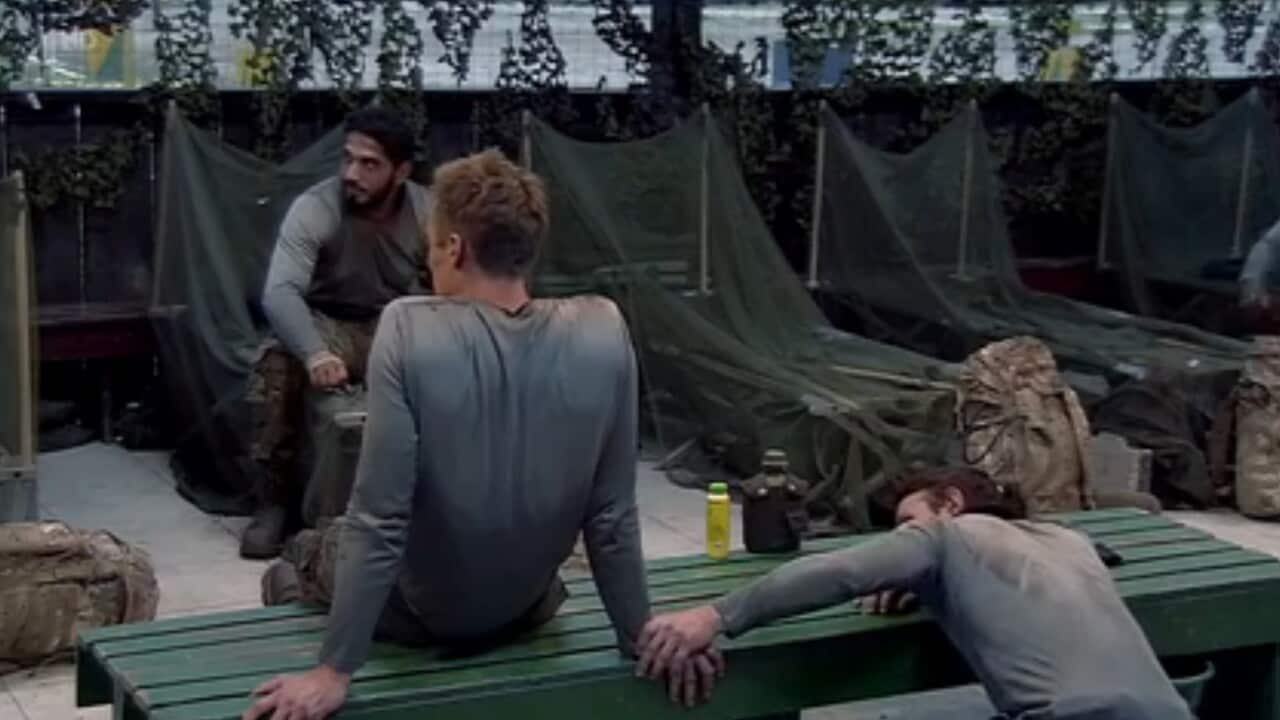Reality competition SAS: Who Dares Wins isn’t the kind of environment you’d expect would enlighten our perspective on the modern man, but surprisingly, that’s exactly what it does.
Rather than just reinforce stereotypes of hard masculinity – though that it is there in force – the show depicts tough but vulnerable men. It shows that these traits are not mutually exclusive, challenging preconceptions about life in an elite military unit and masculinity.
Men should "man up" and show no emotion

Contestants are tested to their limits. Source: Channel 4
"If you want to know what it’s like in the jungle, put a house on your back, go in to a sauna, walk up and down the steps constantly in the sauna, and get somebody to smash you in the face with a load of sticks," says instructor Mark "Billy" Billingham, an ex-SAS sergeant major and bodyguard to Angelina Jolie and Brad Pitt.
The initial 25 contestants are quickly whittled down, either leaving by their own accord or sent packing by intimidating chief instructor Ant Middleton, a former special forces sniper. This is the toughest military entrance test in the world.
As is the pattern in reality shows, the remaining recruits reveal what drives them and the adversity they’ve faced to get here. Things become unexpectedly emotional.
One recruit sheds a tear in remorse, recalling how he boiled over with anger as a teenager after his mother’s death, which ultimately led him to trouble with the law.
Another, Charlie, chokes up as he admits he’s still struggling with grief after the death of his father five years ago. In an unexpected moment that tears apart the idea that men in this competitive, blokey environment wouldn’t physically show compassion, a fellow recruit comforts the grieving Charlie, gently squeezing his hand.
Drill instructors have no heart - or can't show it

Head instructor Ant (right) gives ballet dancer Anthony an encouraging pep talk. Source: Channel 4
"We’re horrible f**kers sometimes,” Billy admits.
In regular tactical questioning where the contestants are woken up at night, hooded and led to a secret interrogation room, instructors purposely grill and psychologically manipulate their subject to gauge and test their mental state.
But it’s not all abuse and bastardry. In an unexpected heart-tugging moment after Ant derides 44-year-old Efrem for being too old to take part in the selection process, the sales director reveals his motivation is to reinforce his connection to his son who was killed serving in Afghanistan.
The confession leaves the interrogators floored and the typically blunt Ant tells Efrem he’s “got some f**king balls” to be taking part, encouraging him to keep going.
During the first series’s intense set of challenges known as “The Sickener”, Ant, in a not uncommon moment, gives professional dancer Antony a quietly encouraging pep talk before a daunting drill. It’s far from the abusive homophobic ranting we’re used to seeing in TV and movies.
Still, Ant’s compassion only goes so far: "We are up here freezing because you can’t f**king grab your balls in your hands and do what’s asked of you.
Mental health?

Contestant Stephen opens up about his mental health. Source: Channel 4
In an unguarded moment, particularly for the hard-as-steel Ant, the chief instructor , "So, basically, he's done what we've all done, but just got caught for it.
"We've done it as kids, haven't we… we've all picked up and smashed car windows and stuff, haven't we? Haven't we?"
Billy confesses: "I threw a bloke through the butcher's window."
Instructor Jason "Foxy" Fox, ex-special forces, adds: "I threw my brother through one."
The hulking Foxy is the most emotionally available out of all of the instructors. In confessionals to camera he admits that he is afraid of failure, can doubt himself, and be overly self-critical. The impact of killing people took a severe toll and he was medically discharged with PTSD.
His honesty and insight is an unexpected, refreshing side to a show that isn’t afraid to peel back the machismo and reveal the vulnerabilities that lie in all men.
Watch the second series of SAS: Who Dares Wins when it starts on Monday 27 March at 8:30pm on SBS.
more on the guide

Can you handle it? 'SAS: Who Dares Wins' is back
